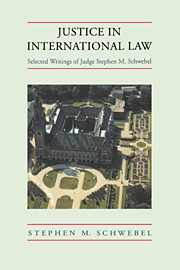Book contents
- Frontmatter
- Contents
- Preface
- PART I International Court of Justice
- 1 Reflections on the Role of the International Court of Justice
- 2 Relations Between the International Court of Justice and the United Nations
- 3 Was the Capacity to Request an Advisory Opinion Wider in the Permanent Court of International Justice than it is in the International Court of Justice?
- 4 Authorizing the Secretary-General of the United Nations to Request Advisory Opinions of the International Court of Justice
- 5 Preliminary Rulings by the International Court of Justice at the Instance of National Courts
- 6 Chambers of the International Court of Justice Formed for Particular Cases
- 7 Three Cases of Fact-Finding by the International Court of Justice
- 8 Indirect Aggression in the International Court
- 9 Human Rights in the World Court
- PART II International Arbitration
- PART III United Nations
- PART IV International Contracts and Expropriation
- PART V Aggression under, Compliance with, and Development of International Law
- List of publications
- Index
2 - Relations Between the International Court of Justice and the United Nations
Published online by Cambridge University Press: 06 November 2009
- Frontmatter
- Contents
- Preface
- PART I International Court of Justice
- 1 Reflections on the Role of the International Court of Justice
- 2 Relations Between the International Court of Justice and the United Nations
- 3 Was the Capacity to Request an Advisory Opinion Wider in the Permanent Court of International Justice than it is in the International Court of Justice?
- 4 Authorizing the Secretary-General of the United Nations to Request Advisory Opinions of the International Court of Justice
- 5 Preliminary Rulings by the International Court of Justice at the Instance of National Courts
- 6 Chambers of the International Court of Justice Formed for Particular Cases
- 7 Three Cases of Fact-Finding by the International Court of Justice
- 8 Indirect Aggression in the International Court
- 9 Human Rights in the World Court
- PART II International Arbitration
- PART III United Nations
- PART IV International Contracts and Expropriation
- PART V Aggression under, Compliance with, and Development of International Law
- List of publications
- Index
Summary
The principles governing relations between the International Court of Justice and the United Nations at first sight seem clear. On reflection, and in the light of practice, they are, in a few important respects, not quite so clear.
Let us begin at the beginning, with the pertinent provisions of the United Nations Charter. Chapter XIV of the Charter is devoted to the International Court of Justice. Article 92 provides:
The International Court of Justice shall be the principal judicial organ of the United Nations. It shall function in accordance with the annexed Statute, which is based upon the Statute of the Permanent Court of International Justice and forms an integral part of the present Charter.
The first sentence of Article 92 complements Article 7 of the Charter, which establishes among “the principal organs of the United Nations … an International Court of Justice.”
What significance is to be attached to the status of the Court as the principal judicial organ of the United Nations? In particular, is the Court to be judicial, or is it to be an organ of the United Nations – two attributes which may not invariably be altogether consistent? To the extent that the Court is to be both judicial and an organ of the United Nations, how may and should these attributes be reconciled?
The second sentence of Article 92 provides a partial answer to that question in that it specifies that the Court “shall function” in accordance with its Statute which is “annexed” to the Charter, which Statute is “based upon” the Statute of the Permanent Court of International Justice and which “forms an integral part of the present Charter.”
- Type
- Chapter
- Information
- Justice in International LawSelected Writings, pp. 14 - 26Publisher: Cambridge University PressPrint publication year: 1994



